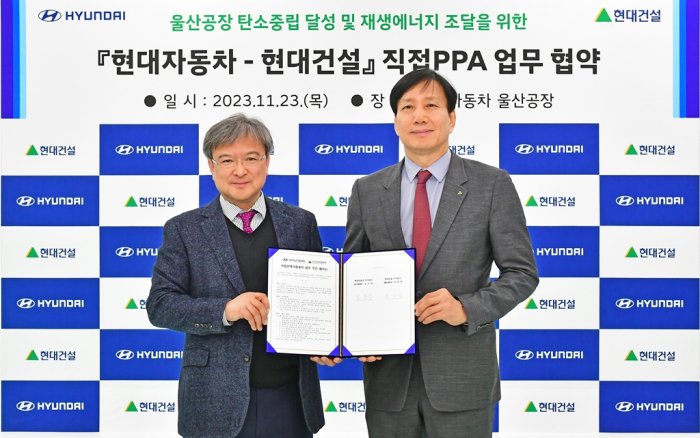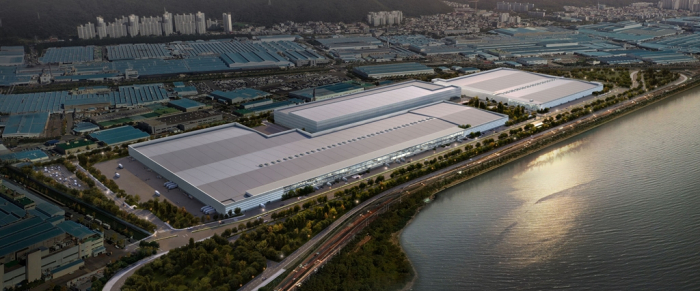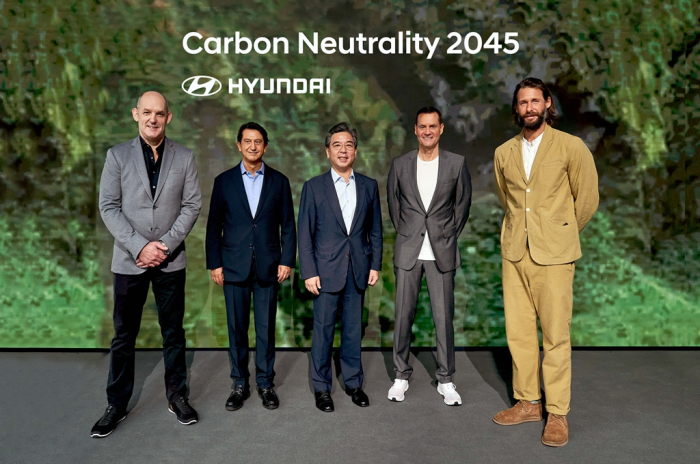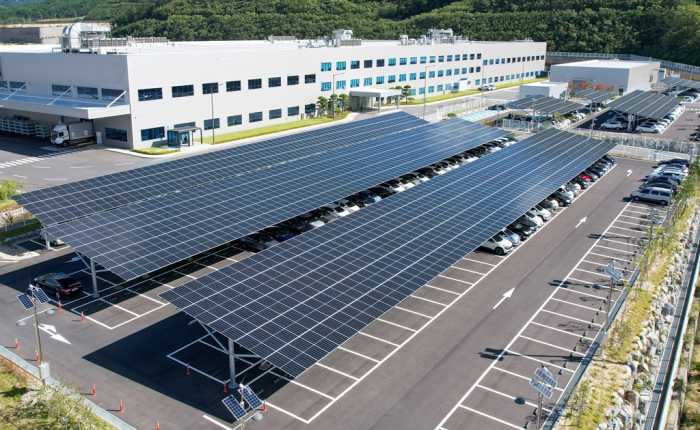Hyundai Motor signs Korea’s largest PPA deal to go carbon neutral
The carmaker also vowed to spend $154 million to build solar energy-generating facilities at its plants by 2025
By Nov 23, 2023 (Gmt+09:00)
LG Chem to sell water filter business to Glenwood PE for $692 million


Kyobo Life poised to buy Japan’s SBI Group-owned savings bank


KT&G eyes overseas M&A after rejecting activist fund's offer


StockX in merger talks with Naver’s online reseller Kream


Mirae Asset to be named Korea Post’s core real estate fund operator



South Korea’s top automaker Hyundai Motor Co. said on Thursday it has signed a power purchase agreement (PPA) with Hyundai Engineering & Construction Co. (Hyundai E&C) as part of its goal to be carbon neutral by 2045, five years ahead of a global initiative.
Under the deal, Hyundai E&C, an affiliate of Hyundai Motor Group, will supply 64 megawatts of solar-cell-generated electricity to the carmaker by 2025 for use at its main car manufacturing plant in Ulsan, southeast of Seoul.
The PPA deal, Korea’s largest direct power purchase from a non-government electricity generator, will help the carmaker slash 39,000 tons of carbon annually – equivalent to removing 23,000 passenger cars from the roads.
The agreement is part of the automotive group’s pledge to achieve carbon neutrality at most of its affiliates by 2045.
In April 2022, four group units – Hyundai Motor, Kia Corp., Hyundai Mobis Co. and Hyundai Wia Corp. – joined the global carbon-free initiative, RE100.

The RE100 or Renewable Energy 100 initiative was first launched by the British non-profit organization The Climate Group in 2014 and currently has nearly 400 member companies around the globe, including Google, Apple, Ikea and General Motors.
The four Hyundai affiliates vow to go carbon neutral by 2045, ahead of The Climate Group’s recommendation that big companies make the full switch to renewable energy by 2050.
Hyundai Mobis, the auto parts making unit of the group, said last year its operations at home and abroad will use renewable energy for 65% of its electricity needs by 2030, and all its electricity needs by 2040.
TO INVEST $154 MILLION IN SOLAR POWER INFRASTRUCTURE
Hyundai Motor said on Thursday it will spend more than 200 billion won ($154 million) by 2025 to build power-generating facilities using solar cells at its domestic plants as part of its RE100 strategy.
Such facilities at idle sites and on roofs of its domestic plants are expected to produce 100 MW of electricity by 2025.

The carmaker said its domestic operations will use renewable energy for 10% of its electricity needs by 2025. The ratio will rise to 30% by 2030. To achieve this, the company plans to generate at least 150 MW of solar energy and purchase 300 MW of electricity from local power-generating firms by 2030.
Its overseas operations will use 100% renewable energy by 2030 through self-generation, PPAs with solar energy producers and purchasing renewable energy certificates (RECs).
Its Czech Republic factory (HMMC) and Indonesian plant (HMMI) have already achieved RE100 through RECs in 2022 and this year, respectively.
Two manufacturing plants in the US – HMMA and HMGMA – and plants in India (HMI) and Turkey (HAOS) are expected to achieve RE100 by 2025, the company said.

NO MORE COMBUSTION ENGINE CARS
Hyundai said it is spending heavily on cleaner transportation and greener energy solutions to achieve its zero-emission target by shifting toward battery electric vehicles and fuel cell electric vehicles.
The carmaker plans to stop selling internal combustion engine models, including hybrid cars, in Europe from 2035, and in other markets such as the US, China and Korea by 2040.
In his New Year’s speech last year, Hyundai Motor Group Chairman Chung Euisun said the group aims to become a top-tier eco-friendly auto brand with its focus on electrification, autonomous driving, robotics and urban air mobility.
“We will proactively respond to climate change through a stable supply of renewable energy,” said a Hyundai Motor official.
Write to Il-Gue Kim at black0419@hankyung.com
In-Soo Nam edited this article.
-
 EnergyLG, SK, Hanwha accelerate shift to renewable energy with push for RE100
EnergyLG, SK, Hanwha accelerate shift to renewable energy with push for RE100Feb 10, 2021 (Gmt+09:00)
3 Min read -
 AutomobilesHyundai Motor to build LNG plant to power its factories
AutomobilesHyundai Motor to build LNG plant to power its factoriesMay 09, 2022 (Gmt+09:00)
3 Min read -
 Carbon neutralitySamsung Electronics to announce plans to join RE100 Initiative
Carbon neutralitySamsung Electronics to announce plans to join RE100 InitiativeAug 14, 2022 (Gmt+09:00)
3 Min read -
 Carbon neutralityHyundai Mobis to power all plants with 100% renewable energy by 2040
Carbon neutralityHyundai Mobis to power all plants with 100% renewable energy by 2040Jul 11, 2022 (Gmt+09:00)
2 Min read -
 Future mobilityHyundai’s Chung charts vision as top-tier eco-friendly auto brand
Future mobilityHyundai’s Chung charts vision as top-tier eco-friendly auto brandJan 03, 2022 (Gmt+09:00)
3 Min read -

-
 Carbon neutralityHyundai Motor chairman vows to go carbon neutral, stresses electrification
Carbon neutralityHyundai Motor chairman vows to go carbon neutral, stresses electrificationMay 25, 2021 (Gmt+09:00)
2 Min read


